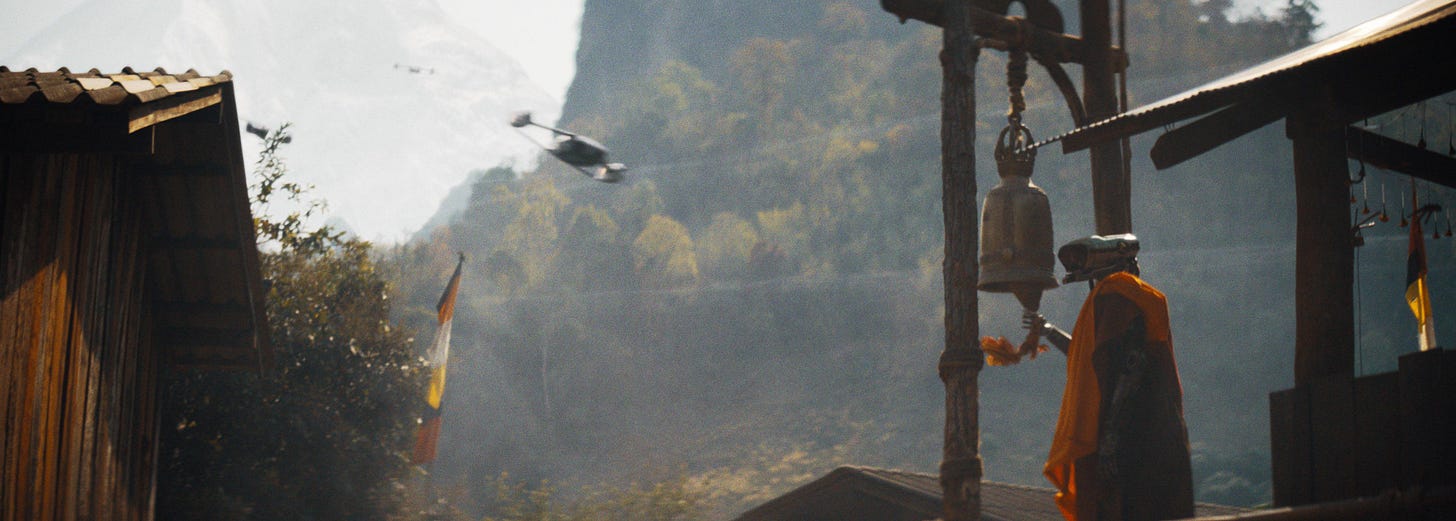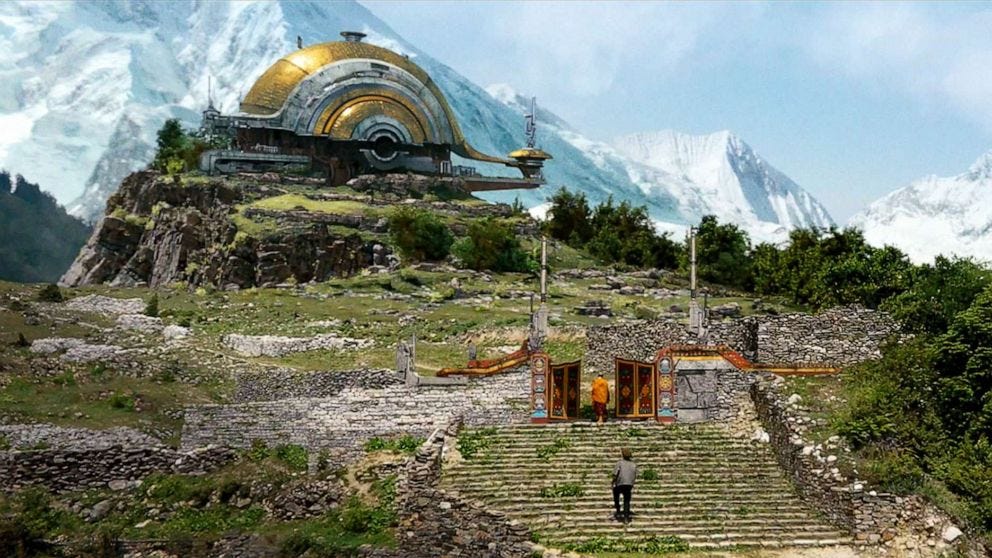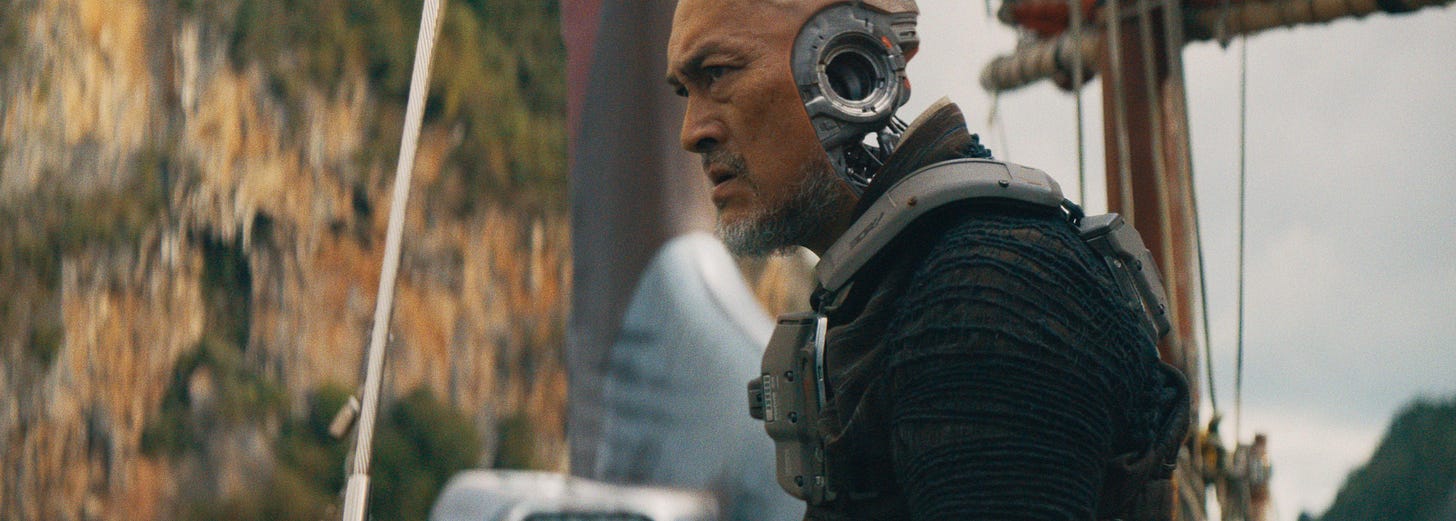Review: "The Creator" is Beautiful, Brilliant, and Frustrating
Gareth Edwards' latest film is a much-needed original work from Hollywood, but its reach exceeds its grasp.
If this year is any indication, it seems that audiences are finally showing tangible tiredness toward Hollywood’s latest wave of franchise films and summer blockbusters.
While Guardians of the Galaxy Vol. 3 and John Wick: Chapter 4 were respectable financial successes, the disappointing box office returns of Ant-Man and the Wasp: Quantumania, Shazam! Fury of the Gods, and The Flash show that studios can no longer rely on brand names alone to insure that their films profit off their ridiculously expensive budgets.
From director Gareth Edwards of Godzilla and Rogue One fame we have a completely original sci-fi film entitled The Creator which tackles questions around artificial intelligence, man’s relationship with rapidly advancing technology, and if machines can ever be socially regarded on the same level as humans. It’s familiar territory we’ve seen in works like Blade Runner and I, Robot, but does Edwards bring anything new to the table?
The answer is a resounding “eh, sort of.” For everything The Creator does well, it does so spectacularly, but its shortcomings are too obvious to ignore and it’s unfortunate that we probably won’t see anything further from the beautifully intricate world Edwards has created.

Set around the latter third of the 21st century, The Creator depicts a not-too-distant future where A.I. is an everyday part of life and humans live side-by-side with artificially-engineered beings known as simulants which display lifelike emotions and personalities. The film opens with a retro 1950s-style newsreel showing the history of this world, and we learn that AI accidentally detonated a nuclear warhead over Los Angeles. This leads to Western nations declaring war on AI, but Asian countries continue to accept them and represent a united eastern bloc referred to as “New Asia.”
Protagonist Joshua Taylor (John David Washington) is a military sergeant tasked with destroying “Nirmata,” the supposed mastermind behind the increasingly powerful AIs. He infiltrates New Asia undercover and marries the daughter of Nirmata (Gemma Chan) to get close, but the extended mission ends with her apparent death and Taylor being extracted back to the United States. Five years later, he’s told by his government that Nirmata is close to finalizing plans for a superweapon which could destroy NOMAD, an American space station capable of launching devastating attacks from anyplace in the world.
Taylor is shown proof that his wife actually survived, which is enough motivation for him to join the new mission and destroy the weapon. He returns to New Asia, but the “weapon” is revealed to be a young simulant girl (Madeleine Yuna Voyles) who has the power to remotely shut off technology. After learning that the child knows the location of his wife, Taylor finds himself conflicted on what side to take in the war for humanity’s survival.
The Creator boasts an intriguing premise, but above all has a world that feels lived-in and believable, which is what all good sci-fi should strive to achieve. If you’ve seen the previews, the comparisons to Edwards’ previous work with Rogue One are inevitable. Both even have the same cinematographer and co-writer, which almost makes The Creator feel like a spiritual successor. Sometimes it feels like Edwards is repeating himself at times, but it does help his case that his Star Wars film was easily the best-looking of the Disney era.
The locations we see in The Creator manage to achieve a dazzling contrast of modern technology with traditional living, something that can be seen even today with many Asian countries. Probably in a tribute to the cyberpunk anime classics like Ghost in the Shell and Akira, Japanese language and text can be found everywhere throughout New Asia, suggesting a la Blade Runner that Japan managed to achieve cultural and economic supremacy at some point in the future. Characters frequently speak in their own native languages, but everyone manages to understand each other due to automatic translators and shared lingua franca.
Touches like that make it apparent that Gareth Edwards put a considerable amount of thought in creating his universe. Just as George Lucas provided enough context for viewers in 1977 to understand the world of Star Wars despite starting from the middle of the story, we quickly get up to speed with the lore and timeline of The Creator. In the little of two hours we get to spend with these characters, I kept wanting to see more and learn more about the environments around them. Unfortunately, the story itself is where so much falls short.
While The Creator is touted as being a rare original IP in the sea of milked Hollywood franchises, there is actually very little new ground being covered with its narrative. The film even opens with the same “More human than human” line famously said by Eldon Tyrell to Rick Deckard in Blade Runner. While clearly intended as an homage, the problem is that Edwards struggles to move past the tropes and cliches we’ve seen countless times over the past 50 years of sci-fi cinema.
The film’s central debate is whether or not AIs can be accepted into human society, but Blade Runner and its sequel covered the concept of artificial people far better due to Replicants being visually indistinguishable from biological organic beings. Spike Jonze’s Her was a heartbreakingly beautiful drama about a romance between a lonely man and a female virtual assistant, which I found to be more believable than the relationships between human beings and AIs in The Creator. And of course if you’ve seen Star Wars, you already know the familiar story beats of a rag-tag group of underdogs attempting to take down a seemingly unstoppable empire.
Perhaps the worst cliche of The Creator, however, is it continuing Hollywood’s odd obsession with repeating the story of Dances with Wolves ad nauseam in a different format. Ok, we get it. Kevin Costner becoming more sympathetic to Native Americans was a fine message. I can accept that The Last Samurai was a unique exploration between the West and Japan. But after Avatar, do we really need yet another film about a soldier going native after gaining a heart and disobeying his orders? The parallels to the Vietnam War we see in The Creator in allusions to films like Apocalypse Now were probably intended to be profound, but they only end up being too on-the-nose because we’ve seen them countless times.
The Creator attempts to cram too much too fast into its 133-minute runtime, and I can’t help but feel that all of this would have been better suited for a limited television series in order to give its ideas and characters more room to breathe. The revelation around what actually lead to the nuclear explosion in Los Angeles which sets off the film’s events is largely glossed over in a brief throwaway line, while the implications of other story threads are barely explored. The original workprint was reportedly five hours long and like Rogue One it’s pretty obvious we’re only seeing a truncated version of the whole picture. One can only hope that #ReleaseTheEdwardsCut gains enough traction.
Despite an undercooked story, the cast is consistently strong. After this film and Tenet, I think John David Washington has a promising career ahead as a reliable leading man for hardboiled action flicks and sci-fi thrillers. He convincingly plays Sergeant Joshua Taylor as a weary and traumatized military veteran, while also having fantastic Lone Wolf and Cub-like chemistry with his child co-star Madeleine Yuna Voyles. Allison Janney as the ostensible antagonist was an interesting choice given her background in more comedic works, but she slips into the role well. And Ken Watanabe will of course always be a welcome addition to any film no matter what it is.
While no one in The Creator is really a bankable star, such measures were likely why the production was able to maintain a budget of “only” $80 million. It’s rather quaint that this is considered to be on the cheap side in today’s world of bloated Hollywood movies, but Edwards proves that you don’t need a small country’s GDP to get the job done. The visual effects ironically look far better than anything Disney has attempted with the MCU in the last few years, and it only illustrates how much of a waste something like Indiana Jones and the Dial of Destiny was. It’s the perfect example of how less can be more, while economical filmmaking is so much of a lost art.
But movies are ultimately a business and it seems that The Creator is struggling just to break even. For whatever reason, 20th Century Studios (which is owned by Disney) has chosen to largely bury the film with very little marketing. Considering how there was little in the way of notable competition in late September and throughout October, it is utterly bizarre that executives did not heavily promote The Creator. Even Martin Scorsese’s Killers of the Flower Moon with its gargantuan three-and-a-half-hour long runtime managed to do better at the domestic box office this month, which should have had less mass appeal in theory.
This means we likely will see no continuation of what The Creator started, though Edwards himself isn’t interested in a sequel. It would be nice to see an expansion of its themes with different characters, but the chances appear slim given the relatively low interest. While I can respect and appreciate The Creator, it’s not a film I can bring myself to truly love. Rogue One remains Gareth Edward’s best work so far and if you liked that you’ll probably find a lot to enjoy here as well, but he has yet to make his magnum opus. Better luck next time.








I’m looking to read more.